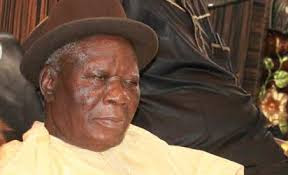Elder statesman and South-South leader, Chief Edwin Clark, tells PUNCH that only restructuring before 2019 can guarantee peace in the oil-rich Niger Delta region
What does restructuring mean to you as a leader of the South-South geopolitical zone?
Restructuring really is nothing but a re-introduction of true federalism, which was practised in the First Republic (1964-1966) when there was devolution of powers to the regions. There were three regions then: we had the Eastern Region, Western Region and the Northern Region.
The late Chief Obafemi Awolowo was the leader of the West. The late Nnamdi Azikiwe was the leader of the East, while the late Ahmadu Bello was the leader of the Northern Region. There was a truly fiscal federalism guided by three principal guidelines.
The first guideline was that everybody in Nigeria is equal with equal opportunity. The second is that the states should develop at their own pace. That’s why the West was able to develop at its own pace by introducing free primary education, establishing a television station, building universities and industrial estates and magnificent structures like the Cocoa House with money realised from the importation of cocoa beans. The Northern Region did the same thing, but their leaders could not introduce free primary education. They also developed the region through groundnut pyramids. The Eastern Region did the same thing; that was how they were able to build the University of Nsukka. They also built Independent Hotel in Enugu and Port Harcourt (Rivers).
The three regions were moving at their own pace. There was no jealousy. There was no crisis. When we had independence in 1960, true federalism was introduced. It enabled each region to keep half of what they produced in their areas while 80 (per cent) of the remaining half was sent to the Federal Government. The rest was shared among the regions.
For my people in the South-South, restructuring does not mean a call for the division of Nigeria, or one group fighting against another group, or one group taking everything. What we are saying about restructuring is devolution of powers to the states, so that they would have more powers to address the challenges they are facing in sectors like education, agriculture, health, transportation and aviation. Some of the critical sectors, we believe, should be on the Concurrent List, so that the states would be able to manage their affairs using their own constitution. A situation where there are 44 local government councils in Kano State, while Lagos, which has the largest population, shares lesser revenue because allocation is being shared based on the number of local government councils per state, is unfair.
A situation whereby we don’t have state police and our constitution states that the governor is the chief security officer, when he has no power over the police, is unacceptable. The commissioner of police sometimes fights the governor as in the case of Benue State over the herdsmen menace. There should be state police as being practised in other parts of the world. Everything about restructuring is contained in the 2014 National Conference. We don’t need another confab. The Federal Government should implement some of the recommendations. Restructuring does not mean secession or the break-up of the country. We need a united Nigeria, but it must be based on fairness, equity and justice.
Do you think that secession should be part of restructuring as being clamoured for by some agitators?
That’s criminal. That’s not allowed. Secession cannot be part of restructuring. What the easterners (Igbo) want is a stop to their marginalisation. They should be part of this country. They were among the three regions that controlled this country. Azikiwe was the first president of Nigeria. We have K.O (Kingsley Ozumba) Mbadiwe, Michael Okpara and many other Igbo nationalists who fought for the nation’s independence. Why will it be now that the Igbo would think that they can no longer be part of Nigeria unless they secede? An Igbo man (Prof. Kenneth Onwuka Dike) was the first indigenous Vice Chancellor of the University of Ibadan. An Igbo man had risen to the rank of the Inspector General of Police in this country in the past. In the First Republic, the Igbo were in the forefront until the Civil War. If, today, some people are talking about secession, how do you think it will be possible to get the Igbo all over the country to return to the East to form one country? I will like to correct an impression here. The claims by some people that the Ohanaeze has seven states are not true. Ohanaeze does not have seven states. The Igbo-speaking people in Delta State are Deltans. Port Harcourt belongs to Rivers State. The Ikwere, Ogoni, Idoni and others are not part of Igboland. If they are looking forward to Port Harcourt, Warri and other places, that cannot be. Their grievances are noticed by all of us. The Igbo have been marginalised, especially by this (Muhammadu Buhari) government. Everybody has been marginalised by this government, except for a section of the North. It is a temporary issue, which should not make the Igbo to secede from this country. Restructuring means, how do we build a new Nigeria?








